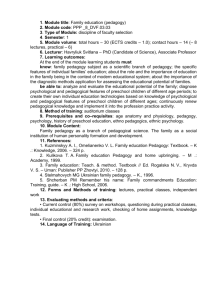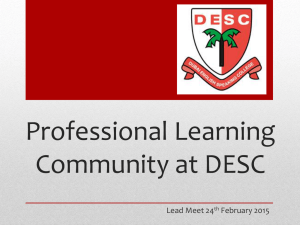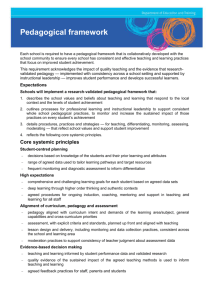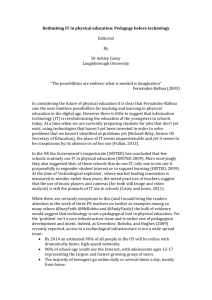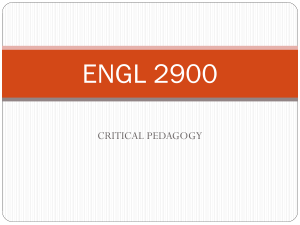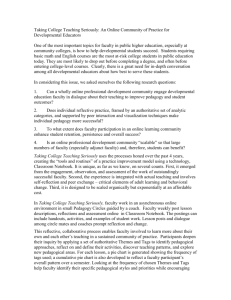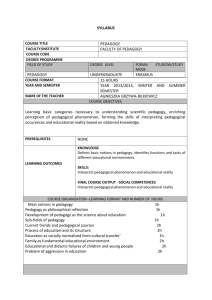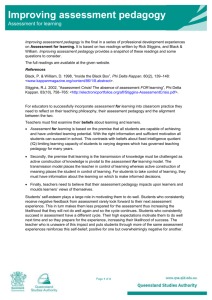Her is my address - University of Cambridge
advertisement
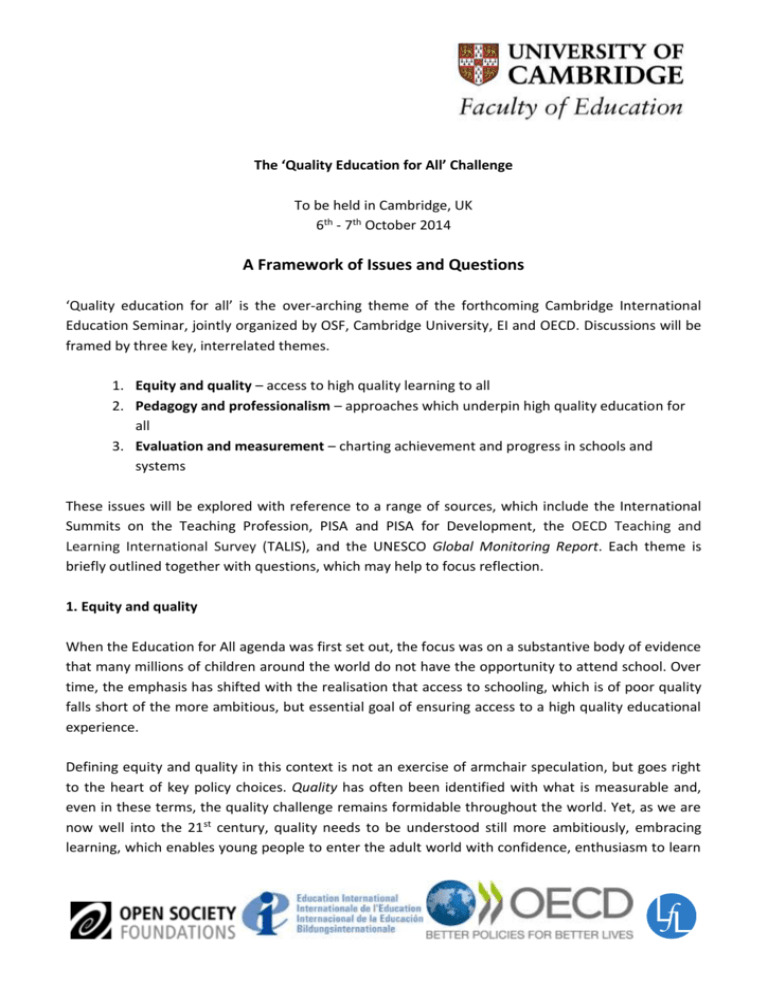
The ‘Quality Education for All’ Challenge To be held in Cambridge, UK 6th - 7th October 2014 A Framework of Issues and Questions ‘Quality education for all’ is the over-arching theme of the forthcoming Cambridge International Education Seminar, jointly organized by OSF, Cambridge University, EI and OECD. Discussions will be framed by three key, interrelated themes. 1. Equity and quality – access to high quality learning to all 2. Pedagogy and professionalism – approaches which underpin high quality education for all 3. Evaluation and measurement – charting achievement and progress in schools and systems These issues will be explored with reference to a range of sources, which include the International Summits on the Teaching Profession, PISA and PISA for Development, the OECD Teaching and Learning International Survey (TALIS), and the UNESCO Global Monitoring Report. Each theme is briefly outlined together with questions, which may help to focus reflection. 1. Equity and quality When the Education for All agenda was first set out, the focus was on a substantive body of evidence that many millions of children around the world do not have the opportunity to attend school. Over time, the emphasis has shifted with the realisation that access to schooling, which is of poor quality falls short of the more ambitious, but essential goal of ensuring access to a high quality educational experience. Defining equity and quality in this context is not an exercise of armchair speculation, but goes right to the heart of key policy choices. Quality has often been identified with what is measurable and, even in these terms, the quality challenge remains formidable throughout the world. Yet, as we are now well into the 21st century, quality needs to be understood still more ambitiously, embracing learning, which enables young people to enter the adult world with confidence, enthusiasm to learn and a strong set of social values, equipped with what are often referred to as ‘21 st century competences’. While measuring equity has proved less elusive, data such as access to school, attendance, provision of support and positive discrimination only tell a partial story. Observational and ethnographic studies have identified deeper-lying issues, such as teacher attitudes and perceptions, peer effects, structural arrangements (streaming, setting ‘ability’ grouping, assessment and testing regimes), all of which have been shown to advantage some while disadvantaging others. These invaluable insights tell us how much remains to be done. Given the scale of the challenges, there are clearly important questions, which probe our collective understanding of ‘quality’, factors which frame classroom practice and open to question the extent to which these may be amenable to policy influence. The relationship between quality and equity has to be understood by those closest to practice, as they are held accountable for the ways in which these issues are addressed in the day-to-day life of classrooms. This implies a readiness and capacity to embrace innovative and far-reaching approaches, matching the scale of ambition. There is also the question of harnessing the potential of non-formal learning and of access through digital technologies, recognising that a ‘quality educational experience’ includes, but extends beyond, formal schooling. And, there is need to recognise that all this is to be realised in the context of (sometimes severely) limited resources, placing a premium on new forms of efficiency that are consistent with high quality education for all. The following are some of the key questions that we may address: What definitions of ‘quality’ and ‘equity’ should underpin the ‘quality education for all’ agenda? How may we better understand the nesting of children’s experience in classroom, school, family and neighbourhood? Where access to quality educational experience is clearly inadequate, what more radical approaches should be considered? How to develop strategic, coherent approaches to realise quality and equity in situations of devolved systems, autonomous and often multiple stakeholders, and rapidly-changing complex circumstances? What is the distinctive contribution of teachers and the teaching profession and how well are they currently equipped to fulfil this contribution? How to exploit the power and potential of digital technologies in ways that are integral with an ambitious understanding of quality learning, the factors that make young people learn best, and without opening up new ‘digital divides’? 2. Pedagogy and professionalism At the heart of education is the teaching/learning interface, what has been described as the ‘pedagogical core’. Yet, it features surprisingly little in the many reform agendas seeking to improve quality and equity around the world. Pedagogy rests on a deep understanding of learning and its integral relationship with the contexts and relationships in which learning develops. Despite the familiarity of everyday notions of ‘learning’, it needs to be more deeply understood if we are to identify the pedagogies that are most likely to improve it. Teaching and learning in the daily business of classrooms – like the iceberg below the waterline – rest on implicit theories, rarely made explicit, nor readily open to critical appraisal of policy. If Robin Alexander is right in his treatise “Still no pedagogy?”, what is required in the short, and longer, term is to create a professional and policy climate in which the nature of pedagogy is understood and it may thrive. While the quality of pedagogy lies beyond straightforward policy influence and is absent from many reform agendas, ignoring the pedagogical core is to ignore the main interchanges that define the quality of the teaching and learning. This is especially pertinent in educating learners whose engagement, cultural capital, or socio-economic resources are the weakest. It implies a profession that is dynamic and collaborative and an openness to others engaged in the educational process, yet in ways that do not dilute the professionalism of teachers themselves. What do we understand by ‘pedagogy’? What forms of pedagogical relationships should be encouraged in moving towards high quality education for all? Can pedagogy be meaningfully discussed in a global context or can it only be understood in its own national, community and institutional culture? How well are teachers equipped to address the pedagogical challenges of high quality education for all, and what is the nature of the profession that can best take this forward in the future? What is the relationship between the nature of pedagogy and the policies that frame teaching and learning? How can they be brought closer together without micro-managing classrooms or stifling quality? In what ways do quality assurance and inspection mechanisms support pedagogy and in what ways may they inhibit it? How can the former be emphasised and the latter minimised? 3. Evaluation and measurement Evaluation and measurement are central to complex, knowledge-based education systems at every level. Education systems rely on, and are fuelled by, evaluative information, informing decisions and progress. The power of feedback to improve education has become increasingly well understood – to the benefit of the individual learner, the teacher, the school and system itself. ‘Feedback’ is however, a more complex and contested process than at first sight. It may disempower as well as empower, determined both by its formative purpose and by knowledge of the individual learner. This, in turn, relies on a professional expertise, a developed understanding of evaluation and assessment and an ability to embed these within a studied pedagogy. At the international level, enormous strides have been made over the past two decades with developing comparative indicators and measures of achievement, notably with highly influential international PISA surveys. It is now two decades since the publication of the seminal volume Education Counts and its much quoted opening sentence: ‘We must learn to measure what we value rather than valuing what we can easily measure’. How much progress has been made at policy level internationally in realising such a goal? More than 20 years later, the major OECD review of evaluation and assessment stated: The point of evaluation and assessment is to improve classroom practice and student learning. With this in mind, all types of evaluation and assessment should have educational value and should have practical value for those who participate in them, especially students and teachers (OECD, 2013: 14). The two positions dovetail: one stressing the importance of basing decisions on measurements that really matter, the other on ensuring that evaluative knowledge is used, first and foremost, to improve practice and learning. Recognising the importance of evaluation and assessment requires us to consider the extent to which the most important dimensions of education tend to get measured, whether the results of measurement are being interpreted and used appropriately, and the extent to which approaches to assessment may inhibit innovation and good practice. With these concerns in mind, a number of key policy questions may help to focus discussion: What does experience of more than half a century show us about what promotes and inhibits learning, teaching and positive change and how best to measure it? What are the most effective approaches to the evaluation of educational systems, schools and classrooms? What does the range of international evaluation studies tell us about the global priorities for education? What is the nature of the evidence and its validity? What can we learn from education systems internationally? Are the various systems of evaluation grounded in, and respectful of, pedagogy, quality and equity? Do attainment and comparative measures sufficiently support a focus on good pedagogy? What assumptions and principles underpin systems of evaluating professional practice and how might they be improved? Generally The three themes outlined above are clearly intertwined. For example, choices about how educational processes are evaluated have important consequences for the development of pedagogy, while questions about pedagogy have, in turn, clear implications for equity. Our seminar needs to be informed by our shared knowledge of the key international sources and publications, which contribute to, inform and enhance the debate. Taking forward the debate and our advocacy as an expert body depends on the extent to which we can draw on that body of work and come to a reasonably coherent view on the issues. References Alexander, R. (2004) Still no Pedagogy? Principle, pragmatism and compliance in primary education, Cambridge Journal of Education 34(1): 7-34 National Center for Educational Statistics (1991) Education Counts: an indicator system to monitor the nation’s educational health, Washington, D.C.: US Dept of Education, Organisation for Economic Cooperation and Development (2013) Synergies for Better Learning: An International Perspective on Evaluation and Assessment, Paris: OECD Publishing. A paper prepared by the planning group for distribution to delegates: John Bangs, Guntars Catlaks and Birgitte Birkvad (Education International) David Frost, John MacBeath, and Sue Swaffield (LfL, University of Cambridge) Hugh McLean, Mary Metcalfe and Aleesha Taylor (Open Society Foundations) David Istance and Dirk van Damme (Centre for Educational Research and Innovation at OECD) June 2014
